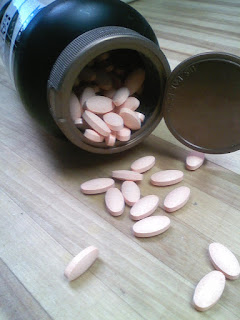Many medications and prescriptions have side effects that we don’t think about. Some of these can influence sexual function. These range from anti-depressants to over the counter medications. Because everyone’s body is different and will react differently to side effects, sometimes people aren’t even aware their body is being affected in a negative way until they consider the medications they are taking and note how this may be effecting their lives.
There
are medications noted to increase or decrease sex drive because it effects hormones. Dopamine
increases sex drive whereas serotonin inhibits it. Drugs that block
testosterone in men, like steroids, will cause difficulty with libido and circulation.
Birth control can suppress
or increase sexual function, depending on how it plays on that woman’s natural
hormonal balance. It can be pretty frustrating, possibly even more depressing,
for people on an anti-depressant who suddenly lack a sex drive and have one
more stress factor in their lives.
If
an anti-histamine, allergy medicine, or birth control is noted to
cause dry mouth, it may also have other dehydrating side effects. Some people
may also experience headaches. The medication can also cause a lack of natural
lubrication. Imagine if one is taking two medications which are dehydrating,
such as an allergy medicine like Claritin and birth control. If a woman
notices an increase of side effects due to the medications she is taking, there
will probably be an increased need to use lubricating products.
What
people often don’t consider is that there are over-the-counter medications like
Benadryl and cold medications which are known to cause drowsiness. Being tired
is going to decrease the sex drive.
Websites
like Net Doctor, always suggest that if one notices side effects on sexual and
is concerned, it is a bad idea to stop taking one’s medication. It is important
to speak with a physician to see if there is an alternative medication
available with fewer or different side effects.
Prescription medications that cause sexual dysfunctions include the following according to Harvard Guide to Women’s Health:
Opiates (codine, morphine and methadone)--effects libido
Anti-depressions--increases difficulty in achieving orgasm
Chemotherapy/Cancer (anti-estrogens, cyclophsphamide)--vaginal dryness, reduced libido, reduced ability to orgasm
Anti-hypertensives (beta blockers, calcium channel blockers, diuretics and anit-adrenergics)--reduces libido and ability to orgasm
Barbiturates --causes many different sexual dysfunctions at high doses
Anti-cholinergics (propantheline and methantheline)--reduces libido
Benzodiazepines (alprazolam and diazepam)--difficulty achieving orgasms
Prescription medications that cause sexual dysfunctions include the following according to Harvard Guide to Women’s Health:
Opiates (codine, morphine and methadone)--effects libido
Anti-depressions--increases difficulty in achieving orgasm
Chemotherapy/Cancer (anti-estrogens, cyclophsphamide)--vaginal dryness, reduced libido, reduced ability to orgasm
Anti-hypertensives (beta blockers, calcium channel blockers, diuretics and anit-adrenergics)--reduces libido and ability to orgasm
Barbiturates --causes many different sexual dysfunctions at high doses
Anti-cholinergics (propantheline and methantheline)--reduces libido
Benzodiazepines (alprazolam and diazepam)--difficulty achieving orgasms
Switching
prescriptions isn’t always an option. For those interested in learning natural
remedies to aid sexual function, please see the post on Miracle Herbs and Aphrodisiacs later next month.

No comments:
Post a Comment